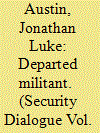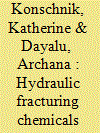|
|
|
Sort Order |
|
|
|
Items / Page
|
|
|
|
|
|
|
| Srl | Item |
| 1 |
ID:
175367


|
|
|
|
|
| Summary/Abstract |
This is an essay about the personhood of militant violence, the phenomenological underpinnings of political evil and the friendship between two men. It begins by recounting the author’s street-side meeting with several Islamist militants in Tripoli, Lebanon, one of whom later described his preparations to become a ‘martyr’ in Syria. The essay takes my conversations with this man and his friends as a means of exploring the becoming of violent militancy as a fundamentally creative and essentially joyful series of encounters that lead to the emergence of extreme violence. To do so, I read the narrative account at the centre of the essay through the concept of social and political ‘fracturing’, which is described as the process through which individuals or groups are able to transcend traditional limits on knowledge, action and belief. This discussion of social and political fracturing is then brought into conversation with the question of what constitutes social or political evil in order to demonstrate that debates over what produces violent militant mobilization have generally missed the crucial relevance of a set of small, intimate and embodied rituals that suffuse evil, violence and war-fighting more generally with a fundamentally positive (yet eventually destructive) phenomenology.
|
|
|
|
|
|
|
|
|
|
|
|
|
|
|
|
| 2 |
ID:
150394


|
|
|
|
|
| Summary/Abstract |
Twenty-eight states require disclosure of hydraulic fracturing chemicals. Twenty-three states direct reporting to FracFocus; additionally, companies in other states use this registry. FracFocus contains the most comprehensive dataset on fracturing chemicals but faces data quality and transparency criticisms. In response, FracFocus announced upgrades, and since May 2015, publishes aggregated data. We used Linux and R version 3.2.0 to clean and analyze 96,449 forms submitted between March 9, 2011 and April 13, 2015 for accuracy, completeness, and timeliness. We characterize data, and compare results to state law and industry practice, to suggest how to induce more accurate and complete disclosures. We find that rates of withheld chemical information have increased since 2013, and appear unaffected by different legal requirements. However, when companies report fracturing chemicals without attribution to the specific products in the fracturing fluid (a “systems approach” to reporting), withholding rates drop four-fold. State deadlines shortened reporting timelines, but compliance rates are low absent indication states will enforce. Automatic field population and prompts in FracFocus can reduce data error, while enforcement signals, education, and harmonized requirements may boost compliance and enhance disclosure. Systems reporting should occur, with states retaining authority to request product-specific ingredient lists.
|
|
|
|
|
|
|
|
|
|
|
|
|
|
|
|
|
|
|
|
|